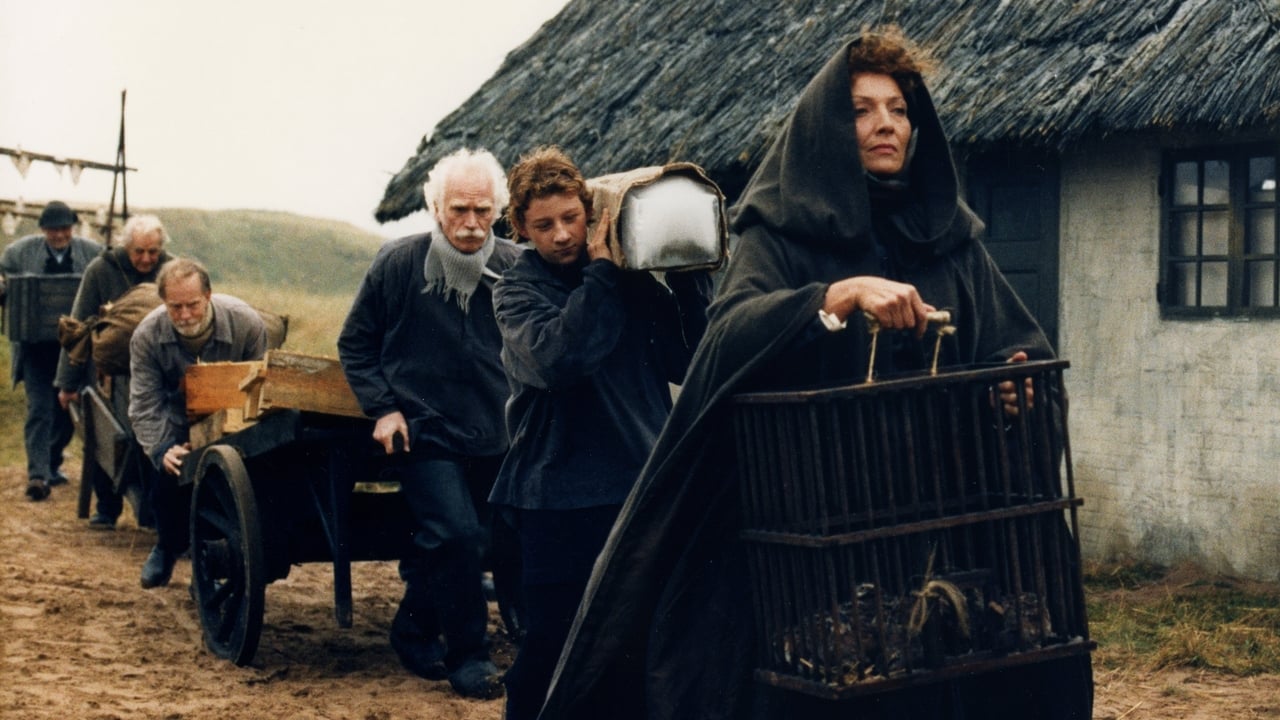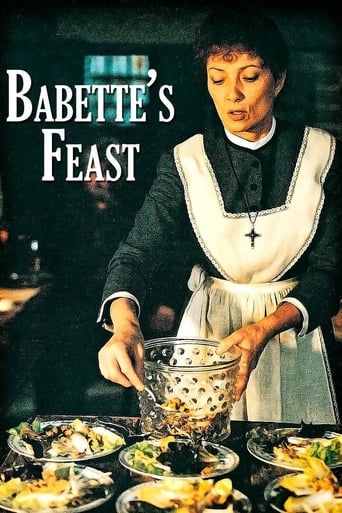PlatinumRead
Just so...so bad
SincereFinest
disgusting, overrated, pointless
Pacionsbo
Absolutely Fantastic
Billy Ollie
Through painfully honest and emotional moments, the movie becomes irresistibly relatable
grantss
Denmark, 1870s. Two deeply religious elderly sisters living in an isolated village take in a French refugee from the Franco-Prussian war, Babette. She becomes their housekeeper and is happy to work for no pay. 14 years later, Babette wins a large amount of money in a lottery. The event coincides with the 100th anniversary of the birth of the sisters' father, a devout Christian minister who had a great following in the village. Babette decides to throw a great dinner for the the remaining followers to honour the occasion. One thing: the dinner will be French and once the ingredients start to arrive, the unsophisticated villagers suspect that something unholy is about to take place.Based on a short story by Karen Blixen (of Out Of Africa fame), this is an engaging, though not overly profound, movie. Starts slowly, showing the sisters' back story and building to the present day. The back story seems unnecessary initially, especially as it seems to wander and add nothing to the overall plot. However, the past, especially the characters therein, will have an important impact on the present.The movie hits its stride in the second half, especially once Babette wins the lottery. A few themes start to emerge and the story becomes more engaging. An important shift takes place, in that the focus moves from the sisters to Babette, and this makes things much more interesting.Unfortunately, the themes that emerge don't lead to anything too profound. I had visions of a powerful examination of how people's prejudices prevent them from enjoying life's simple pleasures, or how great art/food is lost on simple folk, but nothing really came of those.Ultimately, an interesting story, lacking a powerful conclusion. Will make you very hungry though - the food looks fantastic!Won the Oscar for Best Foreign Language Film in 1988.
SnoopyStyle
It's 19th century Denmark. Aged sisters Martine and Philippa live austere lives in a remote settlement founded by their father. He is long dead and the disciples are dwindling. The sisters have a french maid named Babette. The movie flashes back to the sisters as beautiful young women. The village is more vibrant. Officer Lorens Löwenhielm is sent to the remote coast and courts Martine. Opera star Achille Papin from Paris courts Philippa. Their father opposes both. They end up spending their lives taking care of their father. Later, the sisters take in French refugee Babette Hersant. Later still, Babette wins the lottery and asks to cook a delicious French meal for everybody in the village. The sisters relents and then fears the worst for their souls.The strict pious manner really takes the life out of the material for me. It loses the passion and the excitement of the love stories. The narration puts another layer of separation between me and the immediacy of the romances. It becomes something of a stilted story. There is nothing much for the first half. Then it becomes magnificent food porn. It is funny and a joy. I just wish I didn't have to wait so long for it. The first half is no more than 3. The second half is a solid 7.
Hannah Long
I like food. There, I've said it. In a society obsessed with either parceling out each meager calorie or splurging on sugary, prepackaged excess, Babette's Feast is a delight of measured restraint, bounty, and artistry. Wait, am I talking about food anymore?Not really. On a number of levels, this leisurely film is very unusual. There's a long period of set-up, as we learn about Martine (Birgitte Federspiel) and Filippa (Bodil Kjer), the beautiful daughters of a strict minister who lives on the coast of Jutland in Denmark (they're named after Martin Luther and Philip Melanchton, if that tells you anything.)We follow them as they are courted by a soldier and an opera singer, two wayward but sincere outsiders, wooed by the women's kindness and beauty. Ultimately, both sisters reject these men in their devotion to a simple life, lending this first act a feeling of regret and memory. These memories spring up once again many years later when one of the erstwhile suitors sends Babette (Stephane Audran, Brideshead Revisited), a French refugee, to shelter with the two elderly sisters. Uncertain at first (after all, having a servant is an indulgence), Martine and Filippa grow to love Babette, who lends her cooking skills to their ministry. All of this is much welcomed by the congregation, who happily exchange gruel for thick, savory porridge.That's the bare bones of the plot, which is both much less and much more than this simple summary. It is a long, gracefully shot film with a subtle undercurrent of humor among its eccentric, endearing characters.It delves into questions of sacrifice and rejoicing, art and possession, generosity and joy. It is joy, the joy of giving, creating, and receiving, the joy of cooking and eating, which most defines the story, in the same way that the joy of running defined Chariots of Fire or the joy of flying Empire of the Sun, or the joy of fishing A River Runs Through It. And like the joy in those films, it is a palpable thing, an otherworldly ecstasy, and it allows the characters to work their way, without easy compromises, through a history of regret and sadness, into a future of hope.All this in a film about cooking? Well, no. I'm not really talking about food anymore.P.S. Fans of Carl Theodor Dreyer's Ordet may notice two members of the cast reunited in Birgitte Federspiel and Preben Lerdorff Rye.Review originally posted at Longview: http://www.longview95.blogspot.com/2014/07/babettes-feast-movie- review.html
evening1
Much like the delicacies that grace the table in this film, each scene of "Babette's Feast" seems a treat for the senses -- a joy to behold, against the hardscrabble backdrop of Jutland, Denmark. Whenever I am asked to name my favorite film, "Babette's Feast" jumps to mind. Babette is the ultimate role model -- a woman who survives the worst of life only to rebound with strength and vibrancy. I have seen this dazzling movie several times over the years, and in the past I focused on the meal's magical impact on guests at the feast. This time around I found Babette and Achille Papin most compelling."An artist is never poor," Babette reminds us. And aren't we all, potentially, artists? Quoting the French baritone Achille (played exquisitely by Jean-Phillipe LaFont): "One long cry from the heart of the artist -- Give me leave to do my utmost!" Mirroring the bedecked table, the casting here approaches perfection. Stephane Audrane was born to play a French refugee in a small Danish village, bantering with the locals to get a better price on fish. Bodil Kjer and Brigitte Federspiel shine as a pair of religious sisters -- but, for God's sake, why couldn't Lorens's intended utter even a word to the smitten man? And Jarl Kulle fascinates as a worldly general whose military regalia belies a poetic soul. "He visited many times but it seemed to him he grew more insignificant each time." (Wow, does that line nail one of life's sadder experiences!) And later, this sensitive man confides, "...I have learned in life there are some things that are impossible..."I will never forget this film, and if I somehow become stranded on a desert island, this is the only movie I'd ever require. Babette, thank you for your example!

